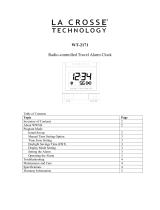
II. PROGRAMMING
A. SETTING THE TIME
There are two methods by which the time and date can be set: 1) Automatically via
WWVB reception, or 2) Manually.
B. WWVB (Radio-Controlled Time)
This method requires you to do nothing, except wait for the signal to be received, and to
select a time zone. Reception usually takes approximately 6-10 minutes during optimal
conditions. The best conditions for reception is at night, between midnight and 6:00
am—when there is less atmospheric interference. To keep your time as accurate as
possible, the alarm clock conducts a WWVB search every night between these hours,
and overrides any manually set time. The WWVB tower icon (appearing in the TIME
LCD) will flash when a signal-search is in progress and a signal is being received, and
will remain steady when the signal has been received. If the WWVB time has not been
received after 10 minutes of battery installation, you may manually set the time or leave
the time function alone (reception will occur regardless).
About Radio Controlled Time signal, WWVB:
The NIST (National Institute of Standards and Technology—Time and Frequency
Division) WWVB radio station is located in Ft. Collins, Colorado, and transmits the
exact time and date signal continuously throughout the United States at 60 kHz. The
signal can be received up to 2,000 miles away through the internal antenna in the alarm
clock. However, due to the nature of the Earth’s Ionosphere, reception is very limited
during daylight hours. The alarm clock will search for a signal every night when
reception is best. The WWVB radio station derives its signal from the NIST Atomic
clock in Boulder, Colorado. A team of atomic physicists is continually measuring every
second, of every day, to an accuracy of ten billionths of a second per day. These
physicists have created an international standard, measuring a second as
9,192,631,770 vibrations of a Cesium-133 atom in a vacuum.
C. PROGRAMMING
(includes manual time setting)
**To end the programming mode at any time, simply press the SNOOZE button
a) Press the SET button. The US map and time zone will flash (“-5” is the default). The
time zone is displayed according to “GMT”; please see below table for explanation.
Press the “+” key to move the time zone West one hour until it reaches the your time
zone, then press the SET key to set the time zone and move to the next programming
step.
b) “DST On” will flash. Press the “+” key to toggle between the Daylight Saving Time
ON or OFF (for places that do not follow Daylight Saving Time changes). Press the
SET key.
3
Eastern time zone
shown
-4: Atlantic, =-5: Eastern
-6: Central, -7: Mountain
-8: Pacific, -9: Alaska
-10: Hawaii
GMT: Greenwich
Mean Time














